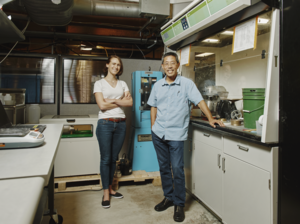
DUST Identity, a Boston-based maker of a diamond-based authentication system for any supply chain, launched out of stealth on Wednesday to announce it has secured $2.3 million in seed funding.
The leading investor is Kleiner Perkins -- the Silicon Valley VC firm that backed many prominent names in the U.S. tech industry, including Amazon, Google and Sun Microsystems. Last year, Kleiner Perkins was the leading investor in the $46 million Series D round of CloudHealth Technologies (later acquired by VMware).
New York-based New Science Ventures, London-based Angular Ventures and Cambridge, Mass.-based Castle Island Ventures participated in the round.
DUST Identity will use the money to grow to 12 employees in the next six to eight months, doubling its current team of six. Polymer scientists, nano-engineers, hardware and software developers specialized in machine vision and artificial intelligence, sales and marketing experts are the profiles the company is most interested in.
Part of the funding round will also be used to advance research and development. Born out of MIT, the company started developing its core technology - called Diamond Unclonable Security Tag, or DUST - under a DARPA-funded program in 2014.
DUST utilizes a coating of tiny diamonds to create a unique, invisible I.D. on any item. Combined with an optical scanner and a cloud-based infrastructure, the system allows controllers to identify and trace items (and the data associated with them) across any supply chain.
"Our diamonds can be as small as ten nanometers, that's the size of proteins," Ophir Gaathon, CEO and co-founder of DUST Identity. "Much smaller than a human cell, but still, in the nanoscale, relatively large."
Gaathon explained that the security at the base of DUST's tech is based on engineering an atomic defect inside the diamonds, which allows the company to quickly spot their orientation. This particular piece of information acts like a fingerprint, allowing only authorized controllers to track items.
"You can think of it as the biometrics, without the bio, for massively-produced objects," Gaathon added.
The idea of a tracking system for supply-chain is not entirely new -- Several companies use RFID tags, which identify items through smart barcodes based on radio frequency technology. A crucial difference with DUST is that an RFID tags cannot distinguish between readers, so the information can be read by almost anyone once it has left the original supply chain.
"Generally speaking, RFID are large, expensive, and tend not to be secure," Gaathon explained in a follow-up email. "DUST Identity's solution starts with military-grade security at the onset, and its application is really easy to integrate into existing manufacturing processes. We fit on the smallest electronic components, at negligible cost per tag. Finally, DUST offers end-to-end tamper detection capability that is now a critical ingredient to any modern security measure."
Currently based in Allston, the company is looking for a new office in Boston with a 'wet lab' area to perform chemical experiments.








